Stephanie Fitzpatrick, Kaiser Permanente Weight Management Researcher
>>Stephanie Fitzpatrick, PhD,
Weight Management Researcher:
– My name is Stephanie Fitzpatrick. I’m a clinical health psychologist and I study health behavior
change and weight management at Kaiser Permanente
Center for Health Research. (introspective spacey music) I have struggled with
obesity all of my life since I was a young girl. And so as I got older
and started to experience the physical pains related to obesity, I started to realize that
something wasn’t quite right.
But I wasn’t quite ready yet. I mean, you have to be ready, right? And so I wasn’t quite ready to lose weight and engage in those behavior changes. But then I started doing some research with some great researchers
on childhood obesity, and I was responsible for talking to African-American
mothers and their daughters about how to eat healthy, how to increase their physical activity, and how to manage their weight. And I thought well, how can
I will be teaching these mothers and their daughters this when I’m not practicing this myself. And so from that point on I decided that making small changes
was what I needed to do. We know that behavioral
lifestyle interventions are effective in terms
of helping people lose 8 to 10% of their initial weight, which is considered a clinically
significant weight loss, reduces risk for diabetes as
well as cardiovascular disease, and improves cardiovascular
disease risk factors. However, what we’ve seen
in our clinical trials is that these behavioral
lifestyle interventions work for about 50% of the people
who are participating. What happens to the other 50%? Well, they experience
some weight loss too, but not to the degree of clinically significant weight loss, the 5% or more that we would like to see.

So part of my research
is trying to figure out what are the psychosocial barriers that may be getting in the way that is preventing everyone from reaching that 5% threshold, or at least that clinically significant
weight loss threshold, and how we refine our
behavioral lifestyle interventions to address those psychosocial barriers and make the intervention more
effective for more people. (introspective spacey music) (clattering) We do have some ideas about
some strategies that work. One is continuing to eat a
low-fat, low-calorie diet, staying physically active,
particularly with moderate to vigorous physical
activities, including walking.
And also self-monitoring, weighing yourself at least once a week, and keeping a food record, just to have an idea about
what your food intake is like and what changes you need to make. When I realized that I needed to start making my lifestyle changes, I started making small
changes very gradually. As simple as moving from whole milk, to 2% milk, to 1%, to skim milk to making sure that I got
at least 20 to 30 minutes of physical activity in my
day five to six days a week, and eventually increased
that up to an hour. When I fix my plate, making
sure that I have a healthy plate or perfect plate: half a plate of vegetables, a fistful of carbs, and a
palm size of meat, and protein. So as I started to gradually
adopt those behaviors to the point where they
became my lifestyle, I was successful and lost 50 pounds over about a year and a
half and have been able to maintain that weight
loss over 10 years. (introspective spacey music).
Long-Forgotten Costa Rican Tradition Helped Me Melt 167Lbs
ᴛɪʀᴇᴅ ᴏꜰ ʙᴇɪɴɢ ᴏᴠᴇʀᴡᴇɪɢʜᴛ
ʜᴏᴡ ᴀ ʟᴏɴɢ-ꜰᴏʀɢᴏᴛᴛᴇɴ ᴄᴏꜱᴛᴀ ʀɪᴄᴀɴ ᴛʀᴀᴅɪᴛɪᴏɴ ʜᴇʟᴘᴇᴅ ᴍᴇ ᴍᴇʟᴛ 167ʟʙꜱ ᴏꜰ ꜱᴛᴜʙʙᴏʀɴ ꜰᴀᴛ ɪɴ ᴜɴᴅᴇʀ 1 ʏᴇᴀʀ ᴡɪᴛʜᴏᴜᴛ ᴅɪᴇᴛ ᴏʀ ᴇxᴇʀᴄɪꜱᴇ!
ᵢ ᵍₒₜ ᶠᵣₒₘ ₂₉₁ ₚₒᵤₙᵈₛ ₐₙᵈ ₘᵢₛₑᵣₐᵦₗₑ, ₐₗʷₐʸₛ ₜᵢᵣₑᵈ ₐₙᵈ ₕₐᵣᵈₗʸ ₘₒᵥᵢₙᵍ…
ₜₒ ₁₂₄, ₛₗᵢₘ ₐₙᵈ ₗₒᵥᵢₙᵍ ₑᵥₑᵣʸ ₛₑᶜₒₙᵈ ₒᶠ ₘʸ ₗᵢᶠₑ!







